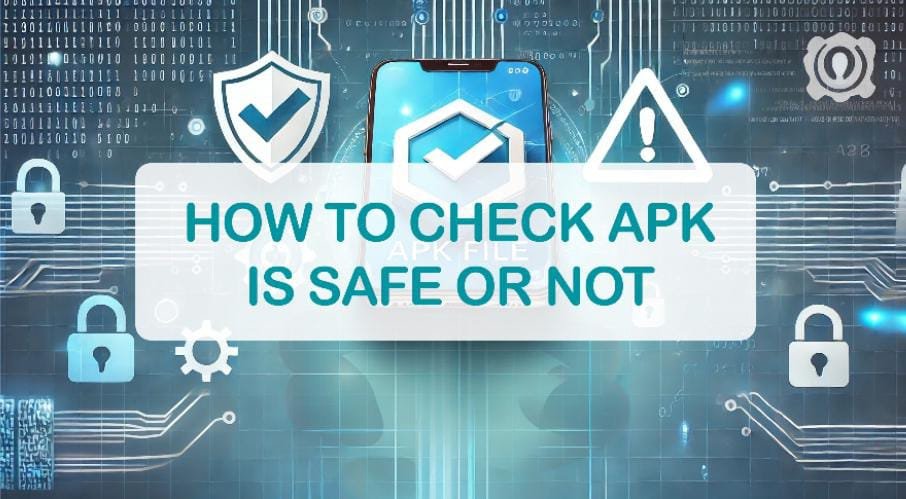Wondering how to check APK is safe or not? Let’s start with a quick story. Imagine downloading a new game APK, only to find your phone acting up after installing it. Scary, right? But here’s the good news: by following simple steps, you can keep your device safe. Ready to learn how?

Potential Risks of Installing Unverified APKs
What’s the worst that could happen with an APK? Unfortunately, plenty. Installing unverified APKs can lead to:
- Malware and Viruses: Harmful software embedded within the APK can steal your personal data or damage your device.
- Privacy Breaches: Suspicious APKs may access sensitive information, like your contacts, location, and even financial details.
- Device Damage: Some APKs can exploit vulnerabilities in your device, causing crashes or bricking your phone.
- Data Theft: Cybercriminals often use fake APKs to siphon data like login credentials or bank details.
Does this mean you should avoid APKs altogether? Not necessarily. But it’s crucial to check their safety before installing them.
Comparing APK Sources: Official vs. Third-Party APK Sites
Here’s a question: Should you always trust official sources? In most cases, yes. APKs from the Google Play Store undergo rigorous vetting for security and compliance. However, there are exceptions, like apps that are no longer supported or regional restrictions.
Let’s compare official and third-party APK sources:
| Source | Advantages | Risks |
| Google Play Store | Verified apps, regular updates | Limited app availability |
| Third-Party Websites | Access to exclusive or early apps | High risk of malware and unverified files |
The takeaway? If you must download from a third-party source, exercise extreme caution.
Methods to Verify APK Safety
Now to the good part: How do you verify that an APK is safe? Follow these practical steps.
Using Online Scanners to Detect Malware
The easiest way to check for threats is by scanning the APK file with an online malware detection tool. Websites like VirusTotal allow you to upload an APK for analysis. These tools check the file against multiple antivirus engines.
How to use an online scanner:
- Download the APK file to your device.
- Visit a trusted malware scanner like VirusTotal.
- Upload the APK file and wait for the scan to complete.
- Review the results. If no threats are detected, the APK is likely safe.
Online scanners are great because they’re quick and free. But they’re not foolproof. Sometimes, newly developed malware might slip through undetected.
Verifying APK Safety with Hash Value Comparison
A hash value is a unique code, much like a digital fingerprint, that represents the specific content of a file. Developers use hash values to help users ensure that the APK they download hasn’t been altered or tampered with. For example, when downloading an APK, the developer often provides its official hash value with a long string of characters. To verify the file’s integrity, you can compare the hash value of the downloaded APK with the official one. If both values match, it confirms that the file is authentic and safe. If they differ, it’s a strong indication that the file has been modified and may not be secure.
Steps to check hash value:
- Use a tool like Hash Droid or a PC-based app.
- Open the app and select the APK file.
- Generate the hash value (usually SHA-256 or MD5).
- Compare it with the official hash value provided by the developer.
If the values don’t match, don’t install the APK.
Checking APK Safety by Analyzing App Permissions
Ever noticed apps asking for suspicious permissions? For example, a calculator app asking for access to your camera? That’s a red flag.
How to analyze permissions:
- To thoroughly analyze the safety of an APK, tools like APK Analyzer can be incredibly helpful. These tools allow you to dive into the app’s details, breaking down the permissions it requests. By examining these permissions, you can determine if the app’s requests are justified for its functionality. For instance, a weather app needing access to your location might be reasonable, but a flashlight app asking for access to your contacts or microphone should raise suspicion. Using such tools, or even manually reviewing the permission list before installation, is an effective way to ensure your privacy and security are not compromised.
- Look for excessive or unrelated permissions, such as:
- Access to your messages or call logs.
- Permissions for your microphone or location.
- If the permissions seem unnecessary, avoid the APK.
This step is crucial because permissions directly impact your privacy.
Enhancing App Security with Google Play Protect
Google Play Protect acts as a built-in security feature for Android devices. It continuously scans all the apps installed on your device, including those downloaded from outside the Play Store, to identify and flag harmful behavior. This tool provides an added layer of protection by analyzing app activities and comparing them to known threats. If it detects anything suspicious, it will notify you or, in some cases, automatically remove the app to keep your device secure. It’s a proactive way to ensure your device stays safe from malware and other risks.
Steps to enable Google Play Protect:
- Open the Google Play Store app.
- Go to Settings > Play Protect.
- Turn on “Scan apps with Play Protect.”
While it’s not a replacement for careful downloading, it’s an excellent second line of defense.
Best Practices for Downloading APKs
Still worried about APK safety? Follow these best practices to minimize risks:
- Download from Reputable Sources: If you’re considering an apk mod download, ensure it’s from a trusted source and always verify its safety before installation.
- Read Reviews: Check what others are saying about the APK. Negative feedback often highlights issues.
- Verify the Developer: Make sure the APK comes from a reliable source.
- Check App Details: Look for mismatched logos, poor descriptions, or fake screenshots.
- Use Security Software: Install antivirus apps like Avast or Norton on your phone for added protection.
By following these practices, you can significantly reduce the chances of downloading a harmful APK.
Addressing Common Questions About APK Safety
1. Can I trust every APK on APKMirror?: While APKMirror is a trusted source, it’s always best to double-check using a scanner or hash value.
2. Are all third-party APKs unsafe?: Not all, but many are. Always research the source before downloading.
3. Do I need an antivirus app on Android?: It’s not mandatory but highly recommended if you frequently install APKs.
4. What’s the difference between an APK and an APKX file?: APKX files are an extended version of APKs, bundling additional features or app data.
5. How often should I scan my APKs?: Scan every APK before installing it. Regular checks help keep your device secure.
Final Thoughts on Verifying APK Safety
Checking if an APK is safe isn’t as daunting as it seems. By using tools like online scanners, verifying the hash value, and analyzing app permissions, you can confidently download APKs without fear. Remember to enable Google Play Protect for extra peace of mind.
Ultimately, the golden rule is simple: If something feels off, trust your instincts. Your device’s safety is worth the extra effort. And hey, with these tips in your back pocket, you’re now an APK safety pro!





